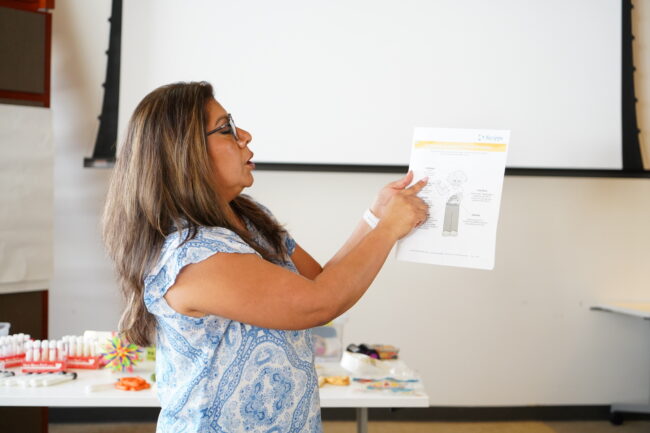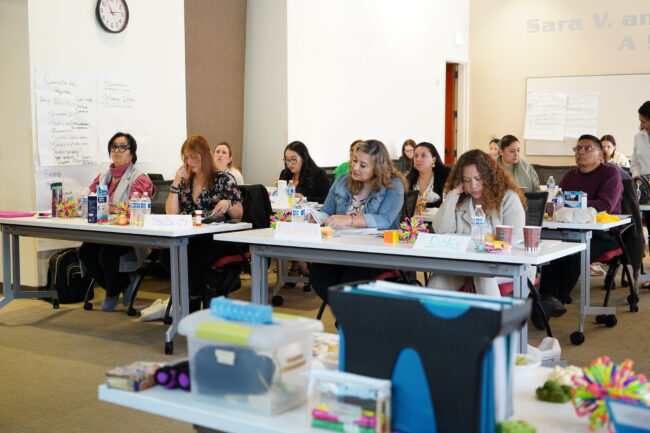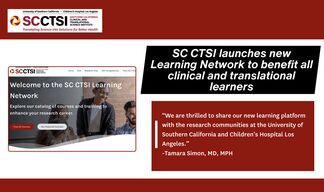SC CTSI Partners with Scripps Whittier Diabetes Institute for Project Dulce Training Aimed at Spanish-Speaking Community Health Workers
Project Dulce, facilitated by health experts from Scripps Whittier Diabetes Institute, provided an intensive three-day training to community health workers, equipping them with knowledge in diabetes care and education.
Community health workers convened from February 27 to February 29 at the USC Health Sciences Campus for a rigorous three-day training session on diabetes management. Project Dulce, as the program is called, is led by experts from the Scripps Whittier Diabetes Institute. Their goal is to equip participants with effective strategies for supporting others in managing their diabetes, focusing on education, prevention, and community-based care.
Initiated in 1997, Project Dulce is recognized by the American Diabetes Association and Medicare as one of a limited number of evidence-based programs that address the needs of underserved populations with diabetes.
The training represents a multi-faceted collaborative effort between the Southern California Clinical and Translational Science Institute (SC CTSI), Chicas Mom Inc., Clínica Monseñor Oscar A. Romero, UCLA Kaiser Permanente Center for Health Equity, and The Wellness Center at the L.A. General Medical Center. Delivered entirely in Spanish, the training emphasized the importance of culturally-sensitive health interventions and focused on building the capacity of community health workers to effectively serve their communities.

“The mission and objectives of Project Dulce focus on an evidence-based peer-educator model that prioritizes a team-based approach to care, centering on collaboration between the public and community health workers. This partnership aims to support community health workers in navigating the healthcare system and advocating for those with diabetes through a structured curriculum specifically designed for paraprofessionals,” stated Monica Ruiz, Program Manager at Scripps Whittier Diabetes Institute.
Ruiz and two colleagues from Scripps facilitated the training – Suzy Sanchez, a diabetes health educator and lifestyle coach, and Jessica Preciado, administrative coordinator. They presented on topics such as overview of diabetes and its types, nutrition, medications and treatments, technology, physical activity, motivation, and the importance of using appropriate language when communicating with individuals with diabetes. They also incorporated presentations by Karla Espinosa de los Monteros, PhD, a diabetes behavioral health specialist at Scripps Whittier Diabetes Institute, and Emily San Diego, PhD, a clinical scholar at the Scripps Research Translational Institute. They both shared insights from their respective research on diabetes.
On the final day, participants presented on topics learned during the training, aiming to apply their newly acquired skills in practice. They were encouraged to present the material as they would to their community, employing appropriate language and a culturally-tailored approach they learned in the sessions. They received constructive feedback from their peers and the facilitators. These discussions prompted participants to share their personal experiences with diabetes, whether living with the condition themselves or caring for relatives and close friends impacted by it.
Adriana Argaiz is the Associate Director of Community Engagement at the Southern California Center for Latino Health, and she invited Scripps Whittier Diabetes Institute to conduct this training for her colleagues at SC CTSI and other community partners.
“This training exemplifies how trusted community members can effectively disseminate evidence-based research on diabetes and other chronic conditions, ultimately enhancing the health outcomes of Latino communities,” Argaiz said.

Community health workers and promotores from partner organizations who attended the sessions are excited to incorporate things they learned from Project Dulce into the presentations and training they provide to the communities they serve.
Project Dulce's efforts are driven by a clear vision for the future, focusing on the scalability and effectiveness of their peer-educator training model.
“Our intended outcome with Project Dulce has been to disseminate our work,” Ruiz said. “Our curriculum has been tested over and over for many years from different angles and perspectives, and at the heart of it is our peer-educator training program. We want to train more folks to replicate this model and enhance the quality of life for people living with chronic conditions, particularly type 2 diabetes.”
As the Scripps Whittier Diabetes Institute looks ahead, it aims to further expand the reach of Project Dulce internationally. They have a special focus on marginalized communities of color who are disproportionately affected by diabetes, and they will continue to forge new partnerships with academic and healthcare institutions nationally and globally. Through this ongoing expansion, the Institute will get closer to their goal of ensuring that diabetes care and education become increasingly accessible to all.



